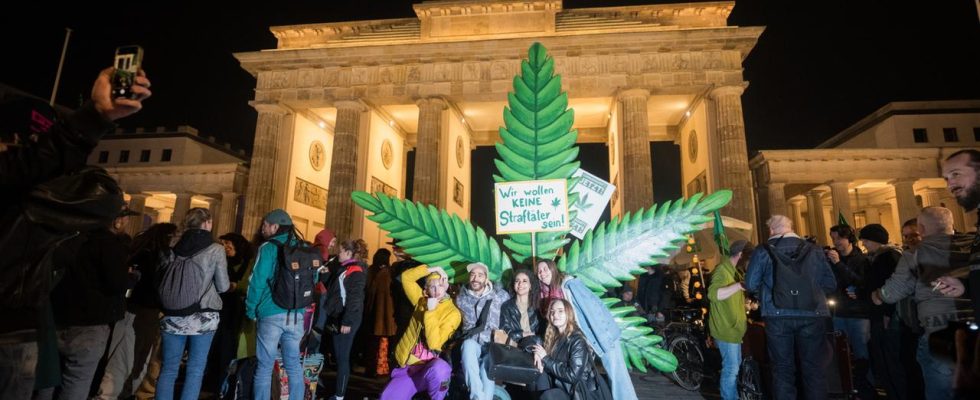From today on, adults in Germany are allowed to legally smoke weed, grow and possess cannabis, subject to certain conditions. Hundreds of people celebrated the new freedoms in front of the Brandenburg Gate. But criticism of the law has not stopped.
Starting today, adults can legally possess and consume cannabis. Justice Minister Marco Buschmann has predicted that partial legalization will mean less work for the judiciary and police in the medium term than they currently do. “The change means a one-off increase in workload, but in the long term the police and judiciary will be relieved,” said the FDP politician to the Editorial Network Germany (RND). “You can then pursue even more relevant crime.”
There are currently more than 100,000 criminal proceedings against cannabis users, said Buschmann. This is a sign of a failed cannabis policy to date. “It placed a heavy burden on the police, public prosecutors and the judiciary, but in reality hardly stopped consumption. Instead, consumers were driven into the hands of dealers with inferior products and hard drugs.”
Smoking marijuana or hashish has been allowed since midnight – a goal that is in the Traffic light coalition agreement and which Buschmann’s FDP party, among others, has repeatedly spoken out for in recent years. Anyone 18 or older can store up to 50 grams at home and carry a maximum of 25 grams outside. Smoking weed is allowed in certain places. It is prohibited, among other things, on playgrounds and in the vicinity of sports facilities, children’s and youth facilities.
Addiction representative insists on commercial model tests
The federal government’s drug and addiction commissioner, Burkhard Blienert (SPD), called on the coalition to decide on model tests for commercial trade after the partial legalization of cannabis. “With the first step, we are only creating improvements for regular consumers. But now it is absolutely necessary to round things out and decide on the model projects as a second pillar,” Blienert also told the RND.
“This is the only way we can ensure that occasional users no longer have to go to the dealer,” says Blienert. It is important that there is a strict ban on advertising when selling in state-licensed shops and that child protection is observed.
The traffic light coalition had originally planned to combine the partial legalization that has been in effect with the release of commercial trade. After discussions with the European Union, this point was initially dropped. Regionally limited and scientifically supported model experiments have now been announced as the second pillar. However, the necessary legal changes have not yet been introduced.
“Smoking” at the Brandenburg Gate
Numerous people celebrated the partial legalization of cannabis in front of the Brandenburg Gate in Berlin that night with lit joints. Several hundred people gathered in an exuberant mood, some dancing to reggae music, as a reporter from the dpa news agency reported. In front of the Berlin landmark, a meter-high cannabis leaf decorated the scene, and lighters glowed just in time for midnight. Shortly afterwards, a strong smell of cannabis wafted across the square.
In numerous other places in Germany, activists also celebrated legalization on Easter Monday and invited people to smoke weed together, take part in discussions and demonstrate.
According to the new law, adults aged 18 and over are allowed to carry up to 25 grams of cannabis for their own consumption. This woman obviously doesn’t want to be recognized.
Söder: “Apply the law extremely restrictively”
The CDU and CSU reiterated their strict rejection of partial legalization. The Union parliamentary group’s health policy spokesman, Tino Sorge, told the dpa news agency that April 1st was “indeed a historic day.” It will “go down in history as the day on which the traffic lights launched an unprecedented economic stimulus program for the black market.”
In the coming weeks, “illegal cannabis from old stocks will flood the market,” says Sorge. He called legalization in its current form a risk to internal security. They will be reversed “after a change of government”.
Bavaria’s Prime Minister Markus Söder (CSU) wrote to X that Germany’s cannabis law was harming itself and endangering the health of the population. “Our country is on the wrong track.” Söder spoke of a fatal mistake. “We will apply the law extremely restrictively,” wrote Söder. They want to make it particularly difficult for stoners in Bavaria.

